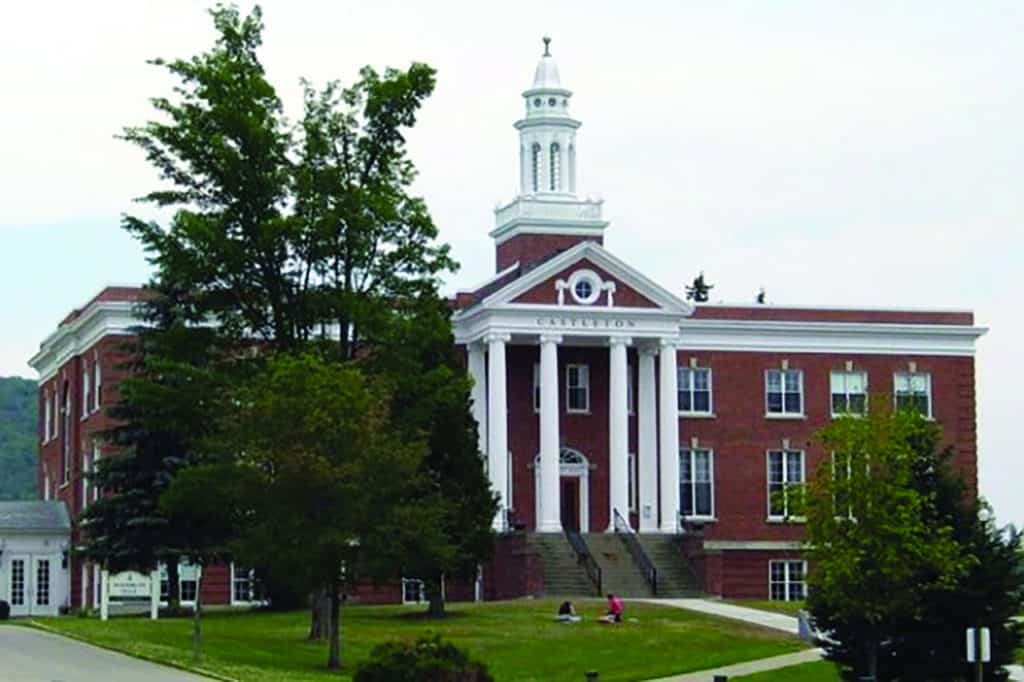
By Emma Cotton, VTDigger
CASTLETON — In Rutland County, a plan to merge Castleton University with two other institutions in the state college system has people worried about losing the identity of the school, which provides an economic boost to the area.
Locals have continued to express disapproval of the plan trustees of the Vermont State Colleges System voted unanimously to approve, Feb. 22. The several-year plan is to consolidate Castleton University, Northern Vermont University and Vermont Technical College into a single university with a common accreditation.
Trustees and the state colleges chancellor’s office are using the placeholder name “Vermont State University” to describe the new institution, though they emphasize that the name isn’t final.
As news of the merger spread, some close to the university have been expressing concerns about the plan’s details, and many have zoomed in on the potential name change.
The university, formerly called Castleton State College, embarked on a costly transition to change its name in 2015. In a recent letter to the community, former university president Dave Wolk and former dean of advancement Jeff Weld credited the name change and a related marketing campaign for increased enrollment and an expansion of extracurricular programs.
“Many other Castleton, Rutland and southern Vermont individuals, businesses, alumni and other groups weighed in on the merger, and the feared future impact on Castleton University, but the decision was made by the Vermont State Colleges board and we are not arguing the wisdom of the merger decision here,” the letter reads. “However, the seemingly haphazard renaming of these institutions deserves more thought and scrutiny.”
Wolk and Weld aren’t the only critics of a name change. Several organizations hope to keep the name, colors and logo of Castleton University, including the Chamber & Economic Development of the Rutland Region (CEDRR) and the Castleton Bridge Initiative, which connects the college to full-time residents of Castleton.

“It’s one of the anchor businesses that help sustain our entire region,” said Lyle Jepson, executive director of CEDRR. “We feel strongly at this point that maintaining the brand is essential, that when one business buys another successful business — which Castleton University is — you don’t change its name.”
Martha Molnar, who leads the Castleton Bridge Initiative, said the university’s rebranding efforts have been effective in attracting out-of-state students, whose higher tuitions subsidize those of in-state students, and she worries that those efforts will be squashed if the university takes on a new name.
“We are afraid that many of the students from out of state who would come here may not come to a university that really doesn’t mean very much to anyone,” she said. “And it will take many years and tons of money to create and build the name recognition that Castleton University enjoys.”
They point to Andrew Breting as a prime example. Breting came from Rhode Island to attend Castleton, where he played football and studied sociology, criminal justice and women’s and gender studies. A few years after graduating in 2016, he opened a pizza restaurant adjacent to campus, which has become a popular late-night spot for students.
Breting said he’s worried about the future of the college, given the name change and other cuts that are taking place. In Rutland County, two other institutions — Green Mountain College and the College of St. Joseph — folded in 2019 largely because of declining enrollment. Watching them has increased his concern.
“Being a business owner in a college town, it’s a scary time because colleges are closing,” Breting said. “Green Mountain College, five miles down the road, I know the business owners in that town. I can imagine what that’s done to their bottom line.”
Castleton University’s interim president, Jonathan Spiro, said he understands why the change has unsettled the community, but Castleton isn’t going anywhere.
“It’s really important for everyone to understand that Castleton is always going to be here, that Castleton is going to thrive in the future, that our future is bright,” he said.
The name change would not be the school’s first. Castleton University traces its history to 1787, to the Rutland County Grammar School, which prepared young men for college. The school changed its name frequently in the 1800s, as it admitted women and expanded its mission. Its names included Castleton Academy, Castleton Academy and Female Seminary, Vermont Classical High School, and Castleton Seminary, according to the book “Big Heart: The Journey to Castleton’s Two Hundred and Twenty-fifth Birthday,” by Tony Peffer, published in 2012.
The latest proposed name, Vermont State University, was proposed first by the staff and faculty union, though it opposes other details of the merger.
Linda Olson, vice president of higher education for the American Federation of Teachers-Vermont, which represents faculty and staff in the state college system, said she isn’t worried about changing the college’s name.
“The ‘Vermont State University’ is something we do believe should happen,” she said, “but we also stress that we think it’s important that each individual campus maintain their own identities and their own brands.”
She imagines a system in which the university retains the “Castleton” part of its name, but under the broader umbrella of “VSU.”
“I don’t think it’s an either-or situation — we either stay completely separate, or we become one system and lose our identity,” she said. “I don’t think you have to do it that way.”
Program cuts
Spiro drew some attention last week after he accidentally announced that the Castleton University marching band would need to make cost-related changes. The president, who believed the marching band had already been informed that it would soon downsize, via a regular newsletter-style communication to faculty, which students soon saw. Many criticized his tone as flippant.
“If you think my decision to forgo an in-person commencement was met with a certain amount of, um, grumbling among the troops, just wait until I tell you about this other cherished tradition that my administration has demolished,” he wrote before relaying his “decision to downsize the scope of the marching band.”
“While we were proud to be the only university in the state with a marching band, the endeavor was no longer sustainable,” the email said.
Spiro has since apologized, holding a town hall with students on Monday to explain the mistake. “I met with them and first of all apologized profusely that this is how they found out,” he said. “That was a mistake on my part, that I erroneously thought they had already been told, and I was really sorry. And they seemed to cut me some slack.”
Breting, who played football at the college, said the band’s downsizing makes him nervous. “That’s where my concern is,” he said. “Where are we five years down the line? Where are we 10 years down the line? Are we going to start cutting these programs?”
Both Castleton University and Northern Vermont University, which has campuses in Johnson and Lyndon, have already cut other programs. Though these are due in part to the state colleges system Policy 109, which requires public colleges to identify and eliminate majors with low enrollment, the cuts are also a result of the system’s request that colleges take a hard look at operating costs.
“This fall, Castleton and NVU undertook a special process to look more closely at the duplication of programs due to each institution’s anticipated operating deficits,” said Katherine Levasseur, the state colleges system’s director of external governmental affairs.
Within that process, Castleton decided this fall to cut its geology, geography, Spanish, women’s and gender studies, and philosophy majors.
Northern Vermont University recently cut its biology, music education and sustainability studies majors, and its journalism major has been swapped out for a program called professional writing, editing and publishing.
NVU’s two campuses were formerly separate entities — Lyndon State College and Johnson State College. In 2016, state college trustees voted to consolidate the schools into the single Northern Vermont University, which will now likely be required to rebrand again.
Both Castleton and NVU will allow students — including freshmen — to complete their majors in the programs being axed, and courses in the subject areas will remain available.
New president
Another notable change: A new president will lead the combined university, taking the helm in January 2022. Current presidents will remain in their positions until the new institution receives its accreditation.
While some worry that Castleton’s identity could be further diminished without a singular face to represent the institution, Olson said the staff and faculty union also supports this move, and hopes trustees will further consolidate the schools’ administrations. She wants to see a greater emphasis on maintaining and expanding programs, and said cutting administrative positions could help.
Serving on the labor task force, she helped to create an alternate proposal that focused more heavily on those consolidations. It suggested including the Community College of Vermont under the new institution’s umbrella, for example.
While trustees and members of the chancellor’s office have adopted some of the labor task force suggestions, Olson said she now feels shut out of the process.
“I think it’s a shame that we’re already cutting majors this early in the game,” she said. “It’s not saving us any sufficient money, whereas if we did actually cut administrative positions, we would be saving substantial money.”
“We now have no public institution teaching geology in the state of Vermont, the Green Mountain State, for God’s sake,” she said. “That’s just unbelievable to me.”
At the same time, she said the merger could make some programs stronger. If Castleton students interested in meteorology wanted to take a class at the Lyndon campus of Northern Vermont University, they could do so.
“That kind of cross-collaboration will make us stronger as a system and also will serve our students and the state better,” Olson said.
Levasseur said the public has been able to comment on decisions made so far, and encouraged the community in Castleton and elsewhere to remain active during the transition by checking on the Vermont State Colleges website, which announces opportunities for public comment and hosts links to the details of the merger. Students will have an opportunity to give input at a student forum in April, for example.
A lot is still up in the air, Levasseur said.
“There’s so much that is going to depend on the feedback that we get from our accreditors on what they think that we should do in order to meet their requirements,” she said. “As always happens, we will be adapting and learning along the way.”




